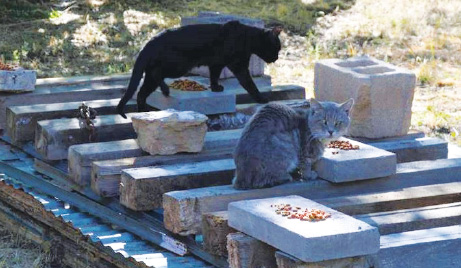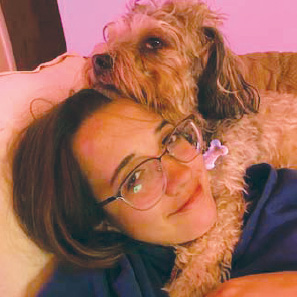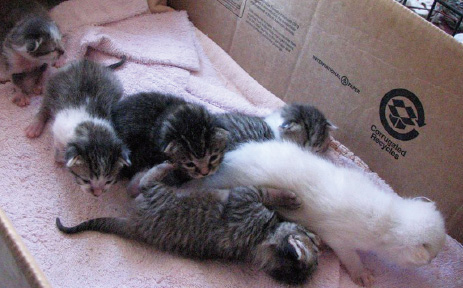
The pandemic has hurt local efforts to spay and neuter feral cats. Photo courtesy of For Pets’ Sake.
Since COVID-19 has spread across the globe, wild animals have begun showing up, not just in backyards, but in city streets emptied of pedestrians and traffic and on roadways, beaches, mountain trails and waterways suddenly devoid of humans.
Many millions of viewers have shared videos of this hopeful phenomenon, as a gesture from Mother Nature giving us a peek of what we can do better when, like the animals, we are let out of lock-down.
Prior to this time our domestic pets were already the favored post on social media. They reign supreme atop exotic foods and politics and rock and roll events. It has been no different during the pandemic except that pets now share the monitor with returning wild animals, seemingly oblivious to our voyeurism, who bring us moments of empathy, compassion, beauty, and rest from the wearying fear implicit in the spread of COVID-19.
COVID adoptions
Thankfully many of the wildly positive reports are true. According to a recent story in National Geographic Magazine, a jellyfish was truly caught on camera swimming in nearly crystal-clear waters of the Venice canals “really close to San Marco Square,” says the biologist filmmaker, Andrea Magoni. And for good reason, “during the lockdown [the combination of] significantly low tide and low traffic on the Venice canals led to the deposition of sediments on the bottom [of the canals] which led to an increased transparency in the water,” which led to the popular short video he made going viral on news channels and social media.

Local resident Summer Singleton with Bilboa,
who has enjoyed Summer being at home.
“It is the most heartwarming of them all,” said Cindy Yurth, president of Blackhat Humane Society, a not-for-profit based in Chinle, Ariz., on the Navajo Nation..
“For the first time ever we can see our effect on the environment and see the benefit to the animals with these shelter–in-place orders.”
It’s also true at Blackhat, she says. “For the first time ever all our adoptable dogs have found new, forever homes, probably kicking up their heels with glee.”
She admitted that while wondrous, it is surprising. It could be that people had time at home away from work to check in on the internet site where the group posts the latest photos and stories of reservation rescue dogs ready for adoption and could take the time to adopt carefully. It could also be a quixotic human correlation to the disenfranchised animals.
Blackhat supporters are extremely loyal, she adds. Their financial contributions have not dwindled during the pandemic, and most surprising is the continuing growth of adoption requests. “They are way up. If we were able to transport every animal that comes on the list we would be averaging four or five a week.” The group has been operating for 19 years.
Dogs that are released to their care or found abandoned are first placed in Blackhat foster homes, where they receive shots, spay/neuter procedures, restorative medical care and house training if they need it.
Once ready for a new home the match is made from their website. The dogs are then transported from foster homes to the new owner.
“They go all over the region,” says Yurth, “rural and urban homes, as far away as Salt Lake City and Denver, even to the east coast.” Many are placed with Native American families, too.
The transfer leg of the operation has been impacted by pandemic guidelines and regulations in each state and on tribal land. The complex diversity of government responses creates a tapestry of regional requirements issued to slow the spread of the novel coronavirus.
“It takes a lot of strategic planning. We have been careful in our requests to build a network of people in multiple locations able to meet another vehicle at a state border, for instance, like building a relay of essential errands linking the transport process together. We’ve been able to transport with great care and respect for everyone and all jurisdictions involved, using masks and social distancing, while respecting curfews and state line restrictions, doing it all from our home computers, too.”
But Yurth expects deep personal sorrow will come to Blackhat during the pandemic. “This morning I got a call from a grazing officer in Many Farms, Ariz., explaining that one of their grandmothers passed away from COVID-19.” She left seven dogs, he told her. “Can Blackhat take them for us? Can you help?’”
Of course they will, Yurth replied. “Sadly, there will be more requests as people die from the virus. The dogs will need new homes.”
Feral cat nursery
Things do not look so cheery for the feral cat colonies in Montezuma and Dolores counties where For Pets’ Sake Humane Society, based in Cortez, has run a successful feral cat program. It was suspended early in the stay-at-home phase of the pandemic.

Many feral kittens have been born in Southwest Colorado this year. Photo courtesy of For Pets’ Sake.
For Pets’ Sake also supports foster care and transport for abandoned animals, spay/ neuter assistance, and emergency medical pet care. All of the programs are funded almost entirely by local events that are cancelled for the coming year. Only the feral cat colony program was put on hold.
In a recent phone call, Marian Rohman, who heads the feral cat program, explained that when state guidelines were announced the group knew their projects would be greatly impacted. The feral cat colony efforts stopped because it is a contact process. The program is entirely volunteer-run and involves close personal contact work, meaning that social distancing is not feasible, nor maintaining a sanitized sit for volunteers.
It handles hundreds of cats in the counties. By working with people in the immediate area of a cat colony, they set up weatherproof shelters and begin feeding the felines every day. Within weeks they trap, neuter and return the cats to the same location, where they continue feeding them.
Some cats show that they want to live with people. If that’s the case For Pets’ Sake finds homes for them. If a female has had kittens, volunteers also trap all the kittens. The feral animals all get rabies vaccinations and, when possible, any sick or injured cats are treated at local clinics.
Now, the feral female cats are pregnant, said Rohman. “Within weeks we’ll see 200 to 250 feral kittens born to the females we couldn’t spay during the pandemic.”
At this time they don’t know when they will reopen the project nor how long it will take to catch up to that impact. It will be years of work even when they are able to resume it safely.
Like most groups, For Pets’ Sake never anticipated such a disaster as the pandemic. What is surprising, Rohman explained, is the reduction in the number of calls for spay/neuter and other pet-related medical issues. They usually field numerous calls every day. But, she said, “there were none during the six-week stay-at-home orders. Now, just this week, as the state and county consider partially lifting the restrictions we are seeing a slight increase.”
For Pets’ Sake’s much-anticipated spring yard sale always attracts thousands of people. The event brings $12,000 to $15,000 directly to the nonprofit’s programs. But it had to be canceled.
New approaches to that fundraiser and others will replace the efforts and hopefully replenish the coffers.
“Plans are in the works, but not there yet. At the moment we are treading water,” said Rohman, “about to sink.”
Seventeen percent of their $152,000 budget comes through grants. The rest is money either donated or raised at local events. The organization is, like Blackhat, all volunteer.
“So you can see we spend it all – and last year we even had a little left over from the year before. Our administrative expenses, including things like advertising, printing, insurance, etc., are a very small part of our expenses – the rest is spent at our local businesses, mostly the veterinarians and some for buying pet food.”
In our rural community animals represent a large chunk of the local economy. Our humane societies also contribute to the revenue stream and the quality of life. It is not surprising that the stay-at-home orders brought negative impacts to local humane societies. But it was also a time of increased appreciation for animals.
Erin Vogel, a social psychologist and postdoctoral fellow at Stanford University agrees. She told National Geographic that “getting a lot of likes and comments [on social media] gives us immediate rewards. In times when we’re all really lonely, it’s tempting to hold onto that feeling, especially if we’re posting something that gives people a lot of hope, the idea that animals and nature could actually flourish during the crisis could give us a sense of meaning and purpose – that we went through this for a reason.”
When we disconnect from the quarantine and go back to workplaces, we will leave our dogs and cats at home. They will re-adjust to our absence. Although they are not the wild animals that have moved us so deeply during the past weeks on our computer screens, they are our real responsibility.
LOCAL HUMANE SOCIETIES
Blackhat Humane Society:. Foster care for abandoned and surrendered animals on the Navajo Reservation, restorative medical care, spay/neuter and vaccinations and adoption. https://www.blackhathumanesociety.org, blackhathumane@gmail. com
Cortez Animal Shelter: Adoption, lost pet services, pet licenses. Kennel Supervisor, Jennifer Crouse. 2791 E Main Street, Cortez, CO 81321, Mon.–Fri., 10–4. 970-565-4910 Fax: 970-564-9758
Denkai Animal Sanctuary: Adoption, vaccines, low income food bank. Thrift store and Adoption center, Mon.– Fri.:10–5; Sat. 10–3. 209 W Main St., Cortez, CO 81321, 970-516-1738
For Pets’ Sake: Foster care for cats and dogs awaiting adoption, financial assistance for spay/neuter, helps pay for local emergency veterinary car, low cost vaccination clinics, feral cat colony program, Adopt a Doghouse Project., P.O. Box 1705 Cortez, CO 81321, http://www.forpetssakehs.org, info@forpetssakehs.org, 970- 565-7387








